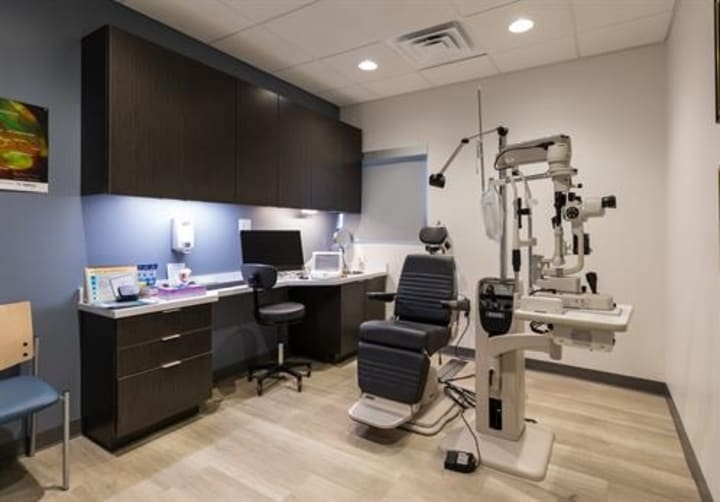My Journey With ICL Eye Surgery
LASIK and PRK isn't for everyone, so here's my experience with ICL implant surgery

Whenever the subject of corrective eye surgery comes up, most people think of procedures like LASIK and PRK. These procedures are where vision is corrected using lasers and tissue removal from the eye. For most people, these procedures is a vast improvement in quality of life and vision, and most people don't regret their decision. The technology and technique has continued to improve over the years, too.
But what happens when someone doesn't qualify for something like LASIK or PRK? Well, I can tell you because I was one of them.

What led me to ICL implants?
I have been in glasses since I was 4 years old and over the past 30 years, the myopia (aka, nearsidedness) in both of my eyes would get worse every year. When this happens, your eye becomes more elongated and the lenses of your glasses become thicker. By the time I reached 30, my eyes were both over a -14.0 prescription.
Because of the elongation of my eyes, there gradually became less and less tissue on my corneas. When there isn't enough tissue, procedures like LASIK/PRK aren't really options because the eye becomes too thin to tolerate the surgery. I was told this by my long-time ophthalmologist, and I always figured I was just stuck in glasses forever. Ideally I would just wear contact lenses, but the times I tried them I was unsuccessful.
As I continued to age, it was getting more difficult to correct properly in glasses. The best I could ever correct in glasses was about 20/40 and over the last 2-3 years, I intentionally under corrected because the thicker my glasses got, the more difficult it became to see with the sharpest possible prescription. I experienced vertigo, I couldn't read menu boards or street signs well, and it was hard to be too far away from computer screens or televisions. Not only that, but it's pretty difficult to find optical shops that can handle a prescription like mine and actually do it right. Even with vision insurance, my glasses would wind up being almost $400 with the frame, the thinnest material, anti-glare coatings, etc.
I went in for my annual eye exam in November 2022 with a new ophthalmologist and I brought up how difficult it has been for me to see over the last few years. He reiterated that I wasn't a candidate for LASIK/PRK surgeries, but he brought up something I had never heard of before - Implantable Collamer Lenses, aka ICL implants.
He explained the procedure, and that it is basically just an implantable contact lens in front of the eye's natural lens. It isn't like cataract surgery where they replace the natural lens with a prescription lens, but he felt I would be a candidate for ICL implants. He referred me to an eye institute here in Denver and within a week or so, I was scheduled for a consultation to determine ICL eligibility.

What is the process for ICL implants?
The initial consultation for the ICL implant ran about two hours and it involved 8-10 different tests. These tests were different scans that took measurements and pictures of my eyes. Nothing was painful and the longest scan took probably 10 minutes. After all of the scans were done, I got a regular eye exam with both the naked eye and with a disposable contact lens to find my exact prescription. After all of the tests and the exam were done, a doctor came in and discussed the results with me. Nothing was glaring about my scans, but they wanted me to make an appointment with a retina specialist to get final approval. They just wanted to make sure my retinas were in good enough shape to tolerate the procedure because of how severe my myopia is.
They had me schedule the ICL procedure before the retina appointment just so it was in motion. I got approval from the retina specialist in March 2023, and from then it was time to prepare for the surgery date in May. In the week leading into my surgery, I had another follow up with the eye institute to fill out paperwork and pay a deposit. I also received prescriptions for three different eye drops and antibiotic pills. You have to start the drops the day before surgery, and start the antibiotic the day of surgery.
What is the ICL surgery actually like?
Checking in for surgery was extremely easy. Unlike other surgeries, you don't have to fast, you don't require an IV, and you can wear your own clothes. I was given my ID bracelets, signed a final consent form, and I paid the final balance for the surgery. When I got called to the PACU, I met my nursing team and was immediately given two Valium pills to calm my nerves. They also rotated giving me three different eye drops, including numbing drops, over the first 15-20 minutes and had me take a pregnancy test. I met my surgeon and after about 90 minutes, the nurses came in and said it was my turn to go into the operating room. I was given a heated blanket and was just leaned back in the chair I was sitting in. The heated blanket was a nice touch because the operating room was very, very cold.
Almost immediately going into the operating room, the surgeon made sure I was doing okay and explained everything they were about to do. They do one eye at a time and start by giving more numbing drops, a numbing gel, and sterilizing the area. Then they placed a tarp over my face with an opening just for the eye, clamped my eye open (think Clockwork Orange style), and the surgeon told me to just focus on the two bright lights above me and prepare for a "Pink Floyd light show." The light show really did happen, too. You see pinks, yellows, greens, and more while the implant is being put in. The only scary thing was when the implant is first put in, everything goes black. The scariest thought going into eye surgery is "what if I go blind?" and for a minute it feels like that. But once the implant is fully unfolded, the vision comes back and you can see the lens shifting around in your eye. You feel some pressure and you can see the shadows of the instruments the surgeon is using. But thankfully, you don't feel any pain because of the numbing drops and the gel.
After both eyes were done, they sat the chair up and my surgeon asked me to read the clock on the wall, and I could read it! Let me tell you, after 30 years... being able to just sit up and see without glasses was an incredible experience. When I came back into the PACU, the nurses gave me the post-surgery instructions and taped plastic shields over my eyes. I also was given a pill to reduce my eye pressure and was sent to the office for an immediate follow-up. I was given pressure control drops and came back that same afternoon to get my eye pressures checked again. I came back the next afternoon again for an eye pressure check and to make sure the ICL's looked good.
What is the recovery from ICL implants like?

At first, it just feels like you took a shower and got some soap or shampoo in your eyes. You feel really tired because of the Valium and your head might hurt a little bit, but the best medicine for all of that is just to rest. They say you can watch TV and stuff, but in my experience it's best to just rest and not be on any devices or anything for the first day or so. Not just because of sensitivity, but also because your vision is going to be really blurry.
I am currently a week out from surgery and it's been an interesting road so far. I don't regret the decision to do the ICL implants, but a lot of the information that exists on the internet is a little misleading, in my opinion. Most articles you read make it sound like after a day or two you are completely normal and ready to go. That is not the case, at least in my experience. My eyes have continued to fluctuate with blurriness and aren't anywhere near 20/20 vision. At my follow-ups, I could make out the 20/30 line and I have noticed that I can read things I wasn't able to read before. But I'm sure I still have some more recovering to do before my vision is 100%. I have also noticed looking at my phone that I can't read things as well unless I hold it farther away from my face.
I also was surprised to find how sensitive to light my eyes have been. Light sensitivity is normal, but I was at a point on days 3 and 4 where I was straight up wearing sunglasses inside of my house. I have gone into a few stores so far and the fluorescent lights are enough to make your head spin a little bit, too. You also get halos around lights & devices and if you catch the light just right, you can see the outline of the ICL in your eye. This is completely normal and they tell you this, but your brain should eventually learn to ignore it. I notice the halos a lot more at night, and more as my eyes get more fatigued.
Things they might not tell you:
- You have to sleep on your back. Sleeping on your side or on your stomach can cause an increase in eye pressure, and can increase the risk of rubbing your eyes against something. This has been hard for me because I am not a back sleeper.
- You can stop sleeping with the eye shields on after 3 nights, but if you're prone to eye rubbing it's wise to just keep them on. This has also been hard for me because I am smack in the middle of seasonal allergies, and all I want to do is rub/itch my eyes.
- You won't be burning a lot of calories, so don't overeat during your week or two of rest. I already feel like I snacked a bit too much at first.
- You can't have sex for at least a week. That includes some self love, so be aware and conscious of that.
- You cannot get any water in your eyes, including regular tear drops. You can cry, but you can't put regular eye drops in your eyes at first. They also advise you not wash your hair for the first week to avoid the risk of getting water/shampoo in your eyes.
- You don't realize how much you bend over until you can't do it. Bending can cause an increase in eye pressure, so you're restricted from bending and/or lifting over 40lbs. I have noticed this when it comes to things like emptying my trash can, dropping a towel, putting something in the dishwasher, doing laundry, or just grabbing something out of the cabinet. It's been... interesting.
The bottom line of recovery that I have learned is you have to be patient and you have to rest. They tell you that you can return to work after a week, and I'm glad they advised me to take two weeks since I work on the computer. I have noticed my eyes fatigue a lot faster when I am looking at devices, even with blue light glasses. If you push yourself too hard, watch too much TV, or look at your phone too much, you will 100% feel it. Find a good audiobook or listen to music and be willing to just lay around with your eyes in a dark space. Your body will thank you.
I have my one week post-op appointment tomorrow and I am looking forward to seeing where I am at in the recovery process. I think a 3-4 week recovery is more realistic for me, as opposed to a 1-2 week recovery, but I am okay with that. I would rather take care of myself and do everything right than rush it and push myself too hard.
About the Creator
Jenika Enoch
I love movies, music, sci-fi, and art. I'm a certified graphic designer and create my own art. Things that fuel me include equality, respect, and anything weird.






Comments
There are no comments for this story
Be the first to respond and start the conversation.